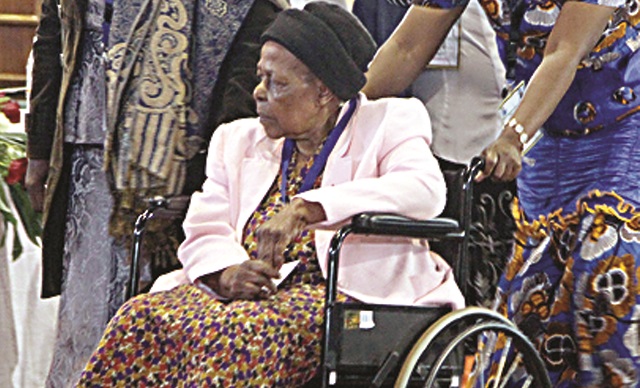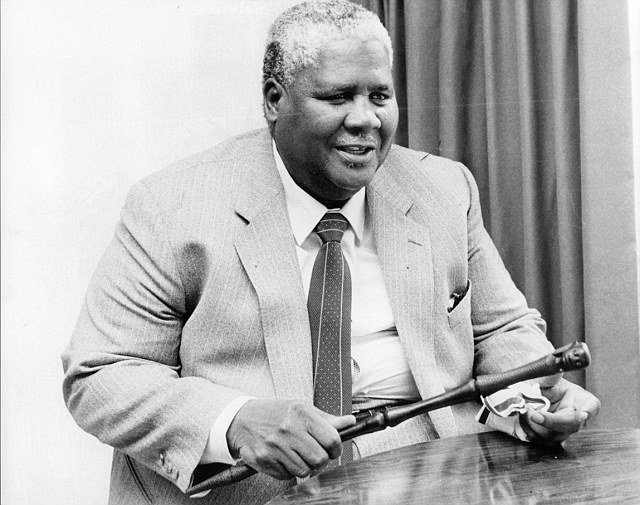Jane Ngwenya sacrificed her marriage for her country

Auxilia Katongomara, Chronicle Reporter
POPULAR American author and actor Michael J Fox in one of his famous quotes remarked: “Family is not an important thing. It’s everything”.
But for Cde Jane Lungile Ngwenya, the liberation of the country was everything. She defied societal demands and patriarchy by sacrificing her marriage for the love of her country.
She is one of the few courageous women who gave up all to join the liberation struggle leaving her family behind.
Such is the story of Cde Ngwenya, one of the few women to be involved in politics at the top level and was arrested and detained for long periods for that.
Cde Ngwenya (83), one of the most senior surviving former Zapu nationalists, has no regrets about losing everything she had as long as she remained loyal to the revolution.
Born in Buhera District in Manicaland on June 15 , 1935, Cde Ngwenya said she decided to venture into politics in the (1950s) because a lot of people feared whites and no one would dare challenge their oppression and that made her angry.
“This pushed me into politics and I was arrested and detained several times on accusations of being a rabble-rouser and for ‘inciting’ other people to revolt against the whites,” said Cde Ngwenya in a recent interview.
She said her husband, George Tinarwo, became impatient with her involvement in politics in the early 1950s leading to their separation. “My husband was not happy with my involvement in politics because on several occasions the Rhodesian police came to our home looking for me. He always complained about that ethi ngumfazi onjani otshona edingwa ngamapholisa? (what kind of wife is always wanted by the police?),” she said.
“Eventually wangala lubaba (he divorced me). However, I was not deterred. I resolved to be married to what I believed because I was angered by the brutality of the whites who had beaten my grandparents. I then remained without a man, ngiyisaliwakazi (divorcee)because of that.”
Cde Ngwenya said they divorced at the Bulawayo High Court and Sir Hugh Beadle who was the judge then said to her: “You are a stupid girl, you destroy your marriage because of silly things said by your people. You cannot run yourselves (black people), you have to say thank you to the people who brought civilisation to your country”.
She said she just ignored him as she wanted to go back to the people and fight the white oppression.Cde Ngwenya who had three children did not remarry afterwards.
“I had three children, Emmanuel, Elizabeth and Shingirai. Two of them have passed on and I am left with Shingirai. All the investment I made was wiped away during inflation in the past years. I also sold all the property I had to finance the education of my children,” she said.
Cde Ngwenya said it was not easy to break the barriers as a woman and take a lead in nationalist politics.
“I was suspended from school while doing Standard Six for posing what was termed a “cheeky” question during a Bible knowledge lesson. I later on became a teacher but quit the profession after refusing to contribute money to buy flowers for a visiting white man’s wife,” she said. “By then teachers were used to brainwash African children. I then joined full time politics at the formation of NDP in 1960 where I was the only woman elected into the 65-member national executive although the party was later banned.”
In the early 1960s Cde Ngwenya served detention at Grey Street Prison, now Bulawayo Prison, and WhaWha detention camp in Gweru before being taken to Gonakudzingwa where she met several nationalists who were also incarcerated at the camp.
She said her political career was spurred by inspiration from founding nationalists such as the late Vice-President Joshua Nkomo, Benjamin Burombo, Joseph Msika and Josiah Chinamano as well as former President Mr Robert Mugabe.
Cde Ngwenya who served as a deputy Minister of Labour, Manpower Planning and Social Welfare in the early 80s was involved in the formation of the Southern Rhodesia African National Congress in the 1952, the National Democratic Party in 1960 and Zapu two years later.
Cde Ngwenya later crossed into Zambia via Botswana to join the liberation struggle where upon her arrival she found Cdes Jason Moyo, George Silundika and Edward Ndlovu in charge of Zapu and she became the fourth leader of the party.
“When I went to Zambia I had got a scholarship from Canada which was organised by Amnesty International to study law.
However, because of the problems the party was facing, I sacrificed that chance and opted to work for the party. Zapu then needed people to re-organise it and so I felt I could not leave for Canada when Zapu was facing all those problems,” she said.
The liberation stalwart who is now living at an Old People’s Home in Bulawayo remains a humble person and says she has no regrets as she worked for her country in her early years.
“I am now living at an old people’s home and I am not complaining. In fact, I am proud that I lived a productive life,” she said.












Comments